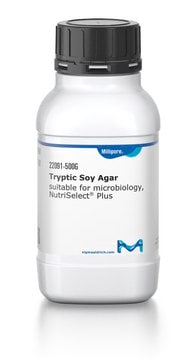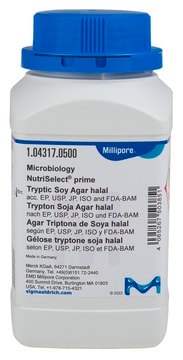51414
modified Tryptic Soy Agar- Dehydrated Culture Media
NutriSelect® Plus, lecithin, polysorbate 80 (Tween® 80), powder, suitable for microbiology
Synonym(s):
CASO Lecithin Polysorbate Agar, CASO-Lecithin-Polysorbat-Agar, Microbial Content Test Agar, Soybean Casein digest Agar with Polysorbate 80 and Lecithin, TSA Lecithin Polysorbate Agar, Tryptone Soya Lecithin Polysorbate Agar
About This Item
Recommended Products
sterility
non-sterile
Quality Level
form
powder
shelf life
limited shelf life, expiry date on the label
composition
agar, 15.0 g/L
lecithin
papaic digest of soyabean meal, 5 g/L
peptone from casein, 15 g/L
polysorbate 80 (Tween® 80)
sodium chloride, 5 g/L
manufacturer/tradename
NutriSelect® Plus
final pH
7.3±0.2 (25 °C)
application(s)
cleaning products
clinical testing
cosmetics
environmental
food and beverages
personal care
pharmaceutical
sterility testing
surface monitoring
microbiology
suitability
Micrococcus spp.
nonselective for Aspergillus spp.
nonselective for Bacillus spp.
nonselective for Candida spp.
nonselective for Enterococcus spp.
nonselective for Escherichia coli
nonselective for Pseudomonas spp.
nonselective for Salmonella spp.
nonselective for Serratia spp.
nonselective for Staphylococcus spp.
nonselective for Streptococcus spp.
nonselective for bacteria (General Media)
nonselective for coliforms
Looking for similar products? Visit Product Comparison Guide
General description
Application
Preparation Note
Footnote
The designations basic, plus, or prime are added to indicate the quality control level, from basic quality control to standard QC plus to prime for full regulatory compliance.
Legal Information
Storage Class Code
11 - Combustible Solids
WGK
WGK 3
Flash Point(F)
Not applicable
Flash Point(C)
Not applicable
Personal Protective Equipment
Choose from one of the most recent versions:
Already Own This Product?
Find documentation for the products that you have recently purchased in the Document Library.
Customers Also Viewed
Our team of scientists has experience in all areas of research including Life Science, Material Science, Chemical Synthesis, Chromatography, Analytical and many others.
Contact Technical Service











